Sir John Monash, Personal Files Book 2, 23 February - 31 March 1915, Part 12
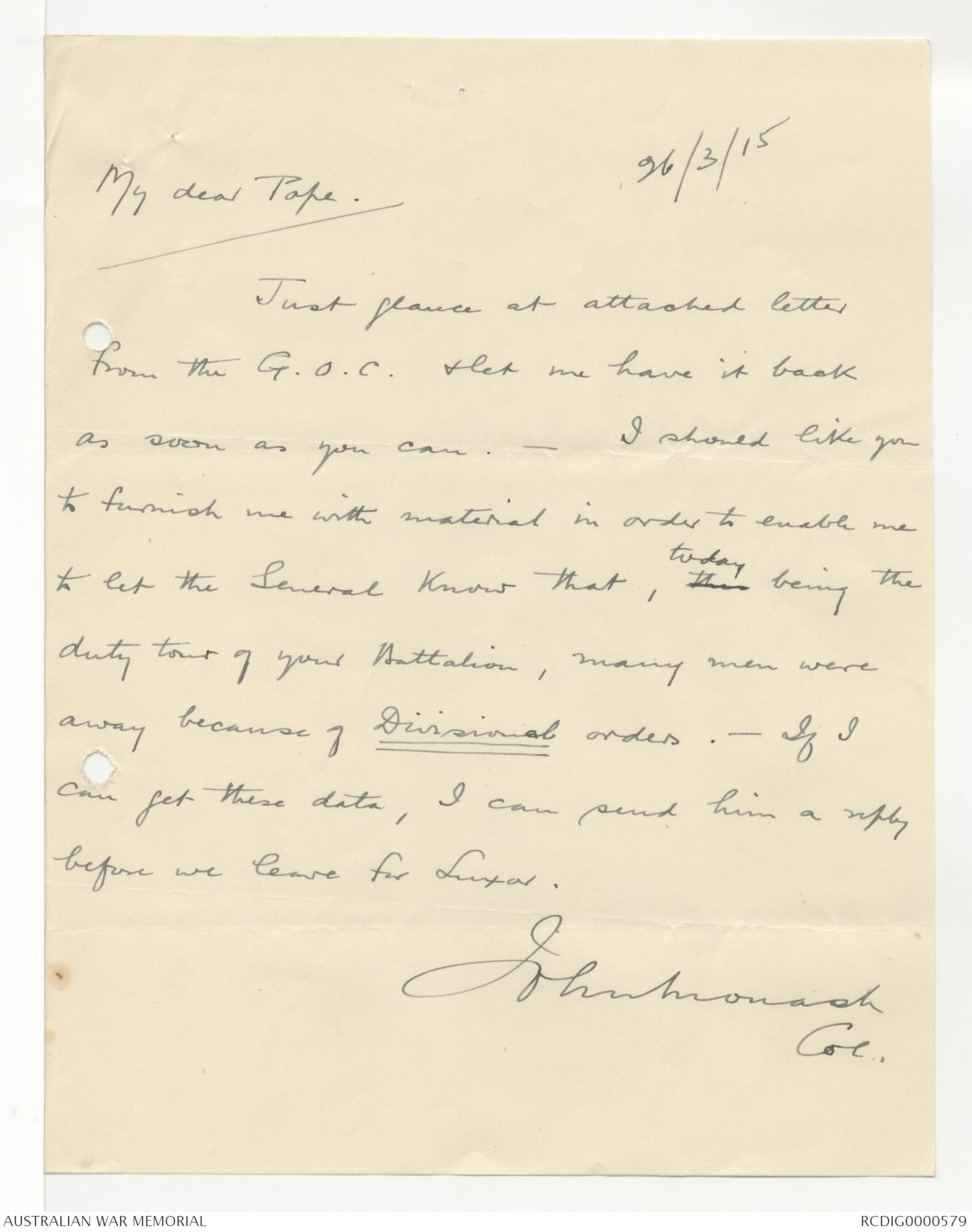
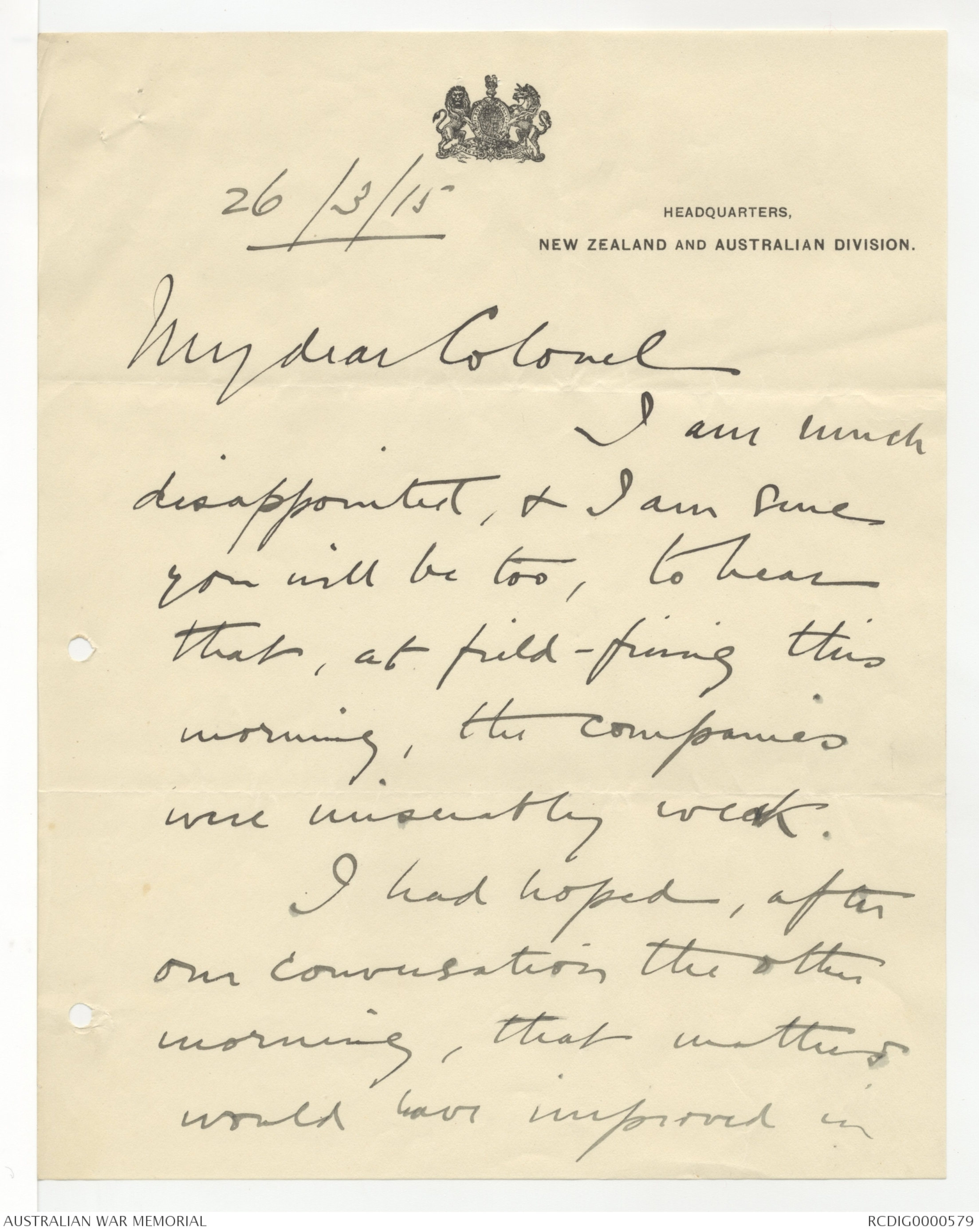
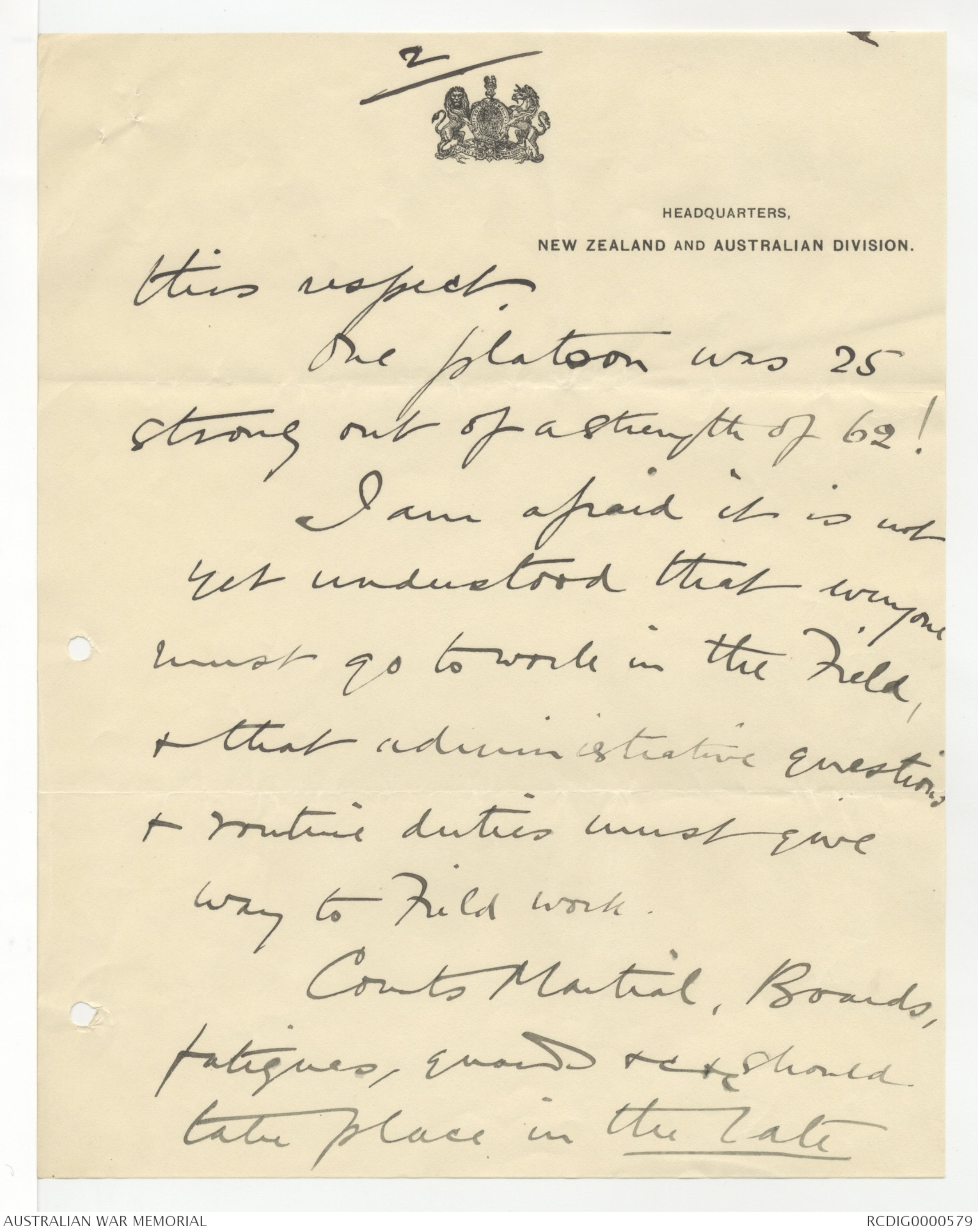
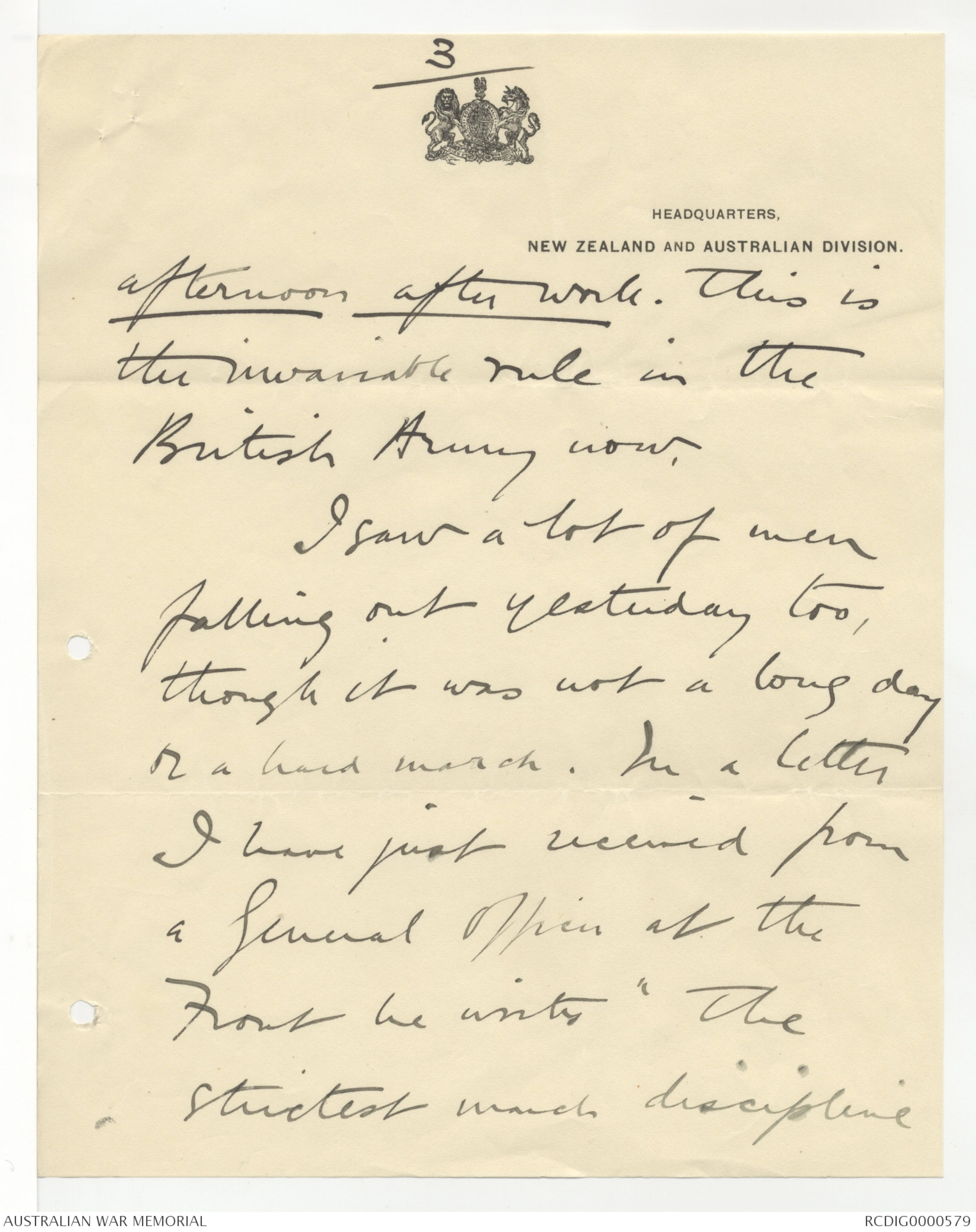
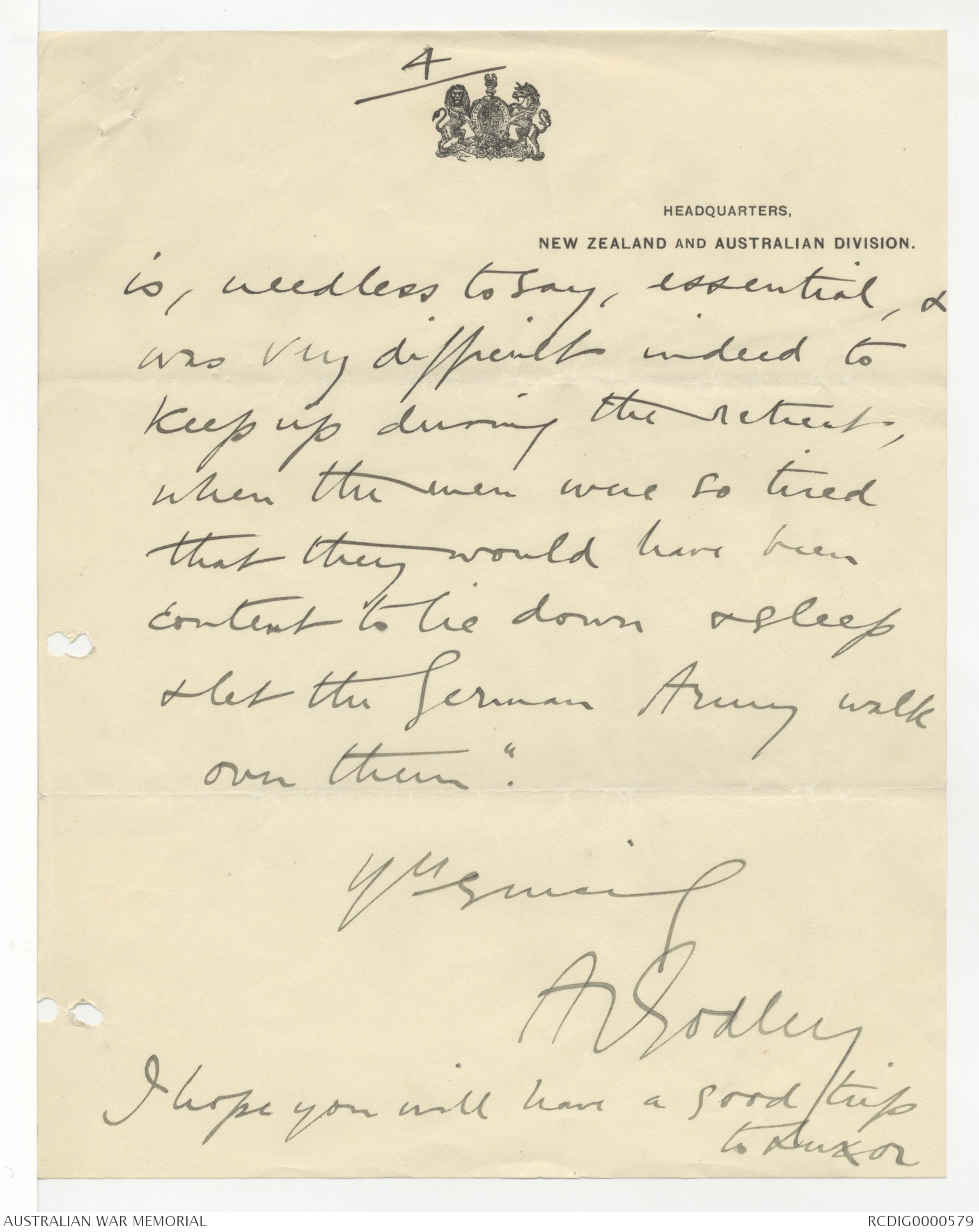
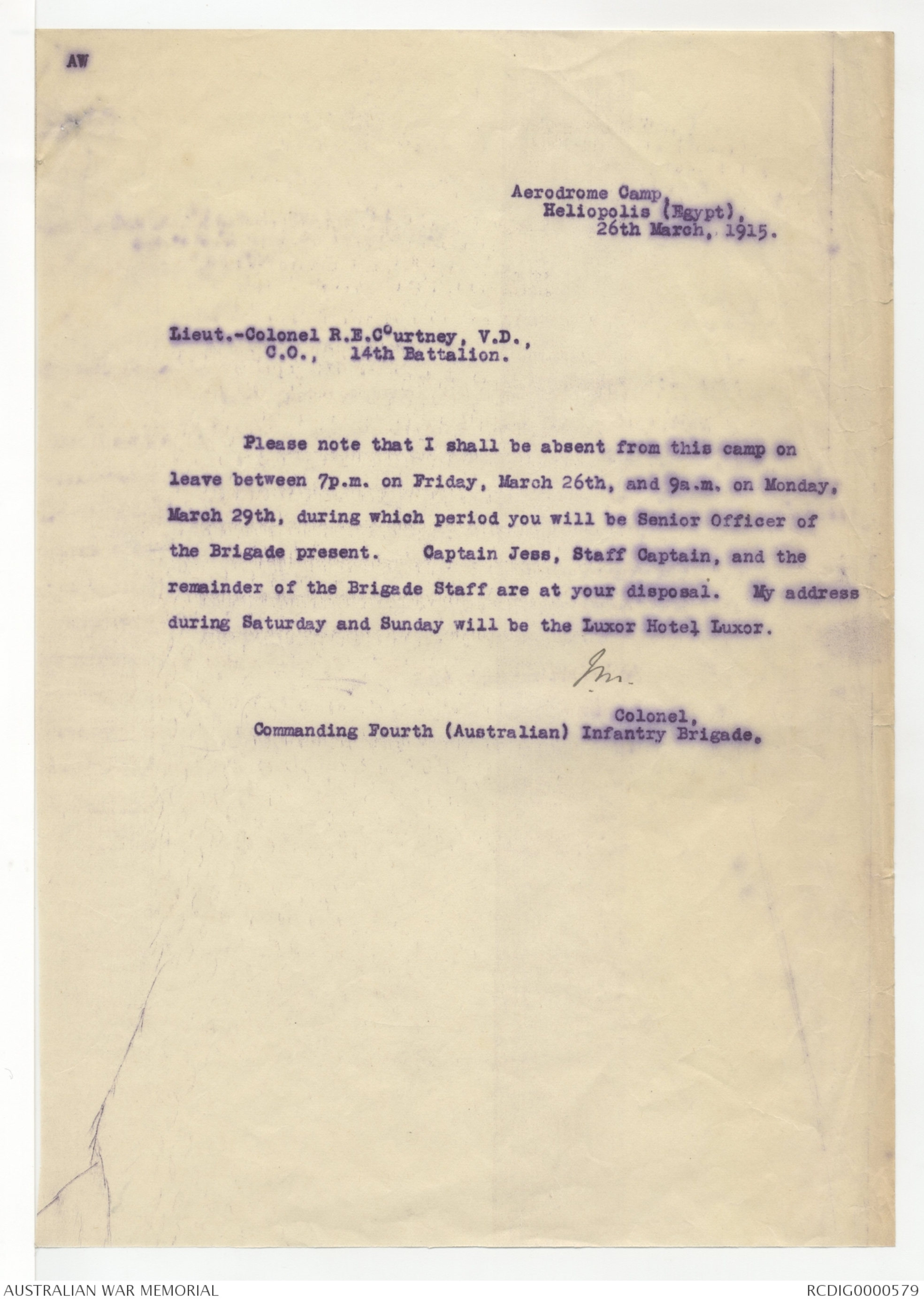
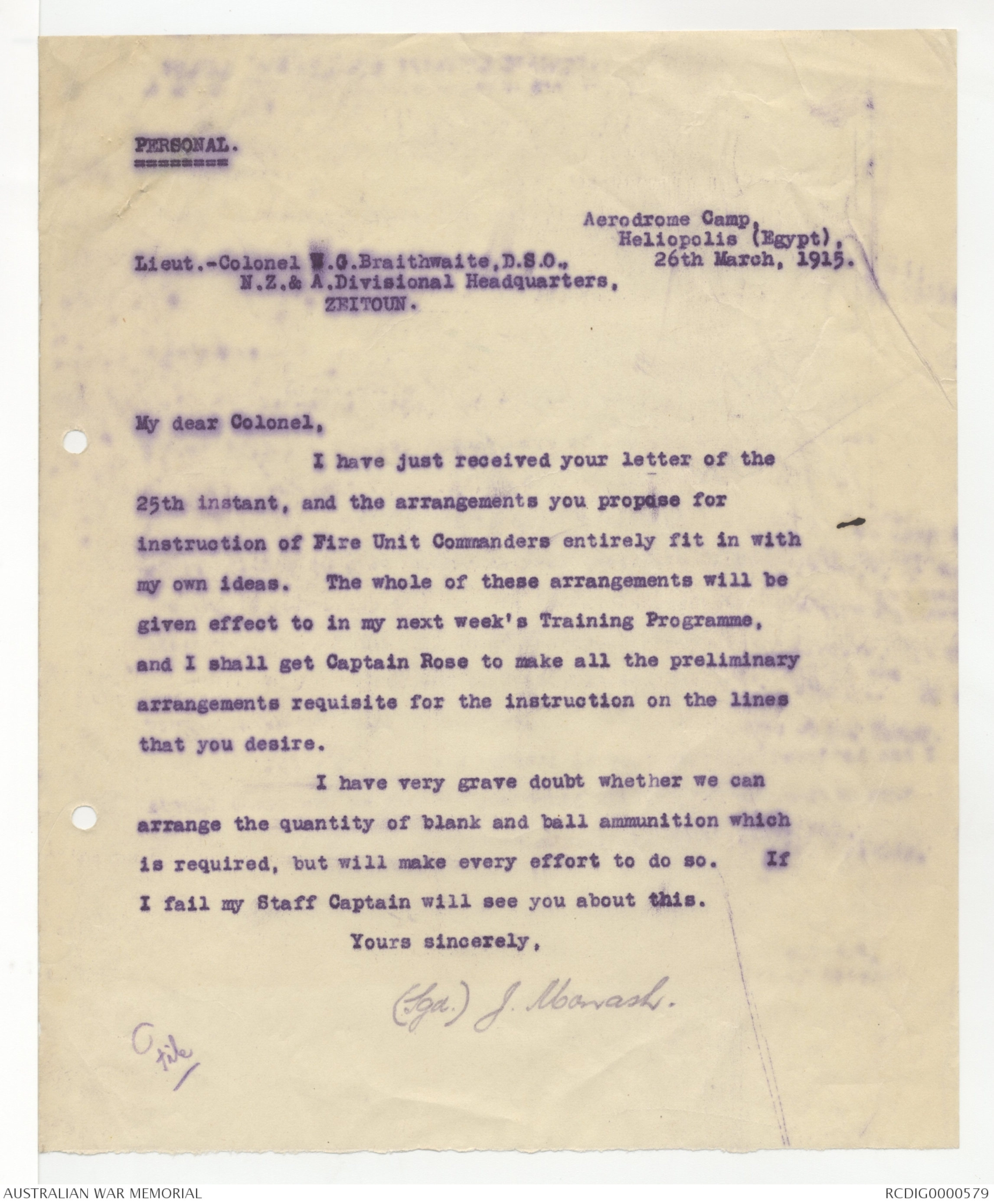
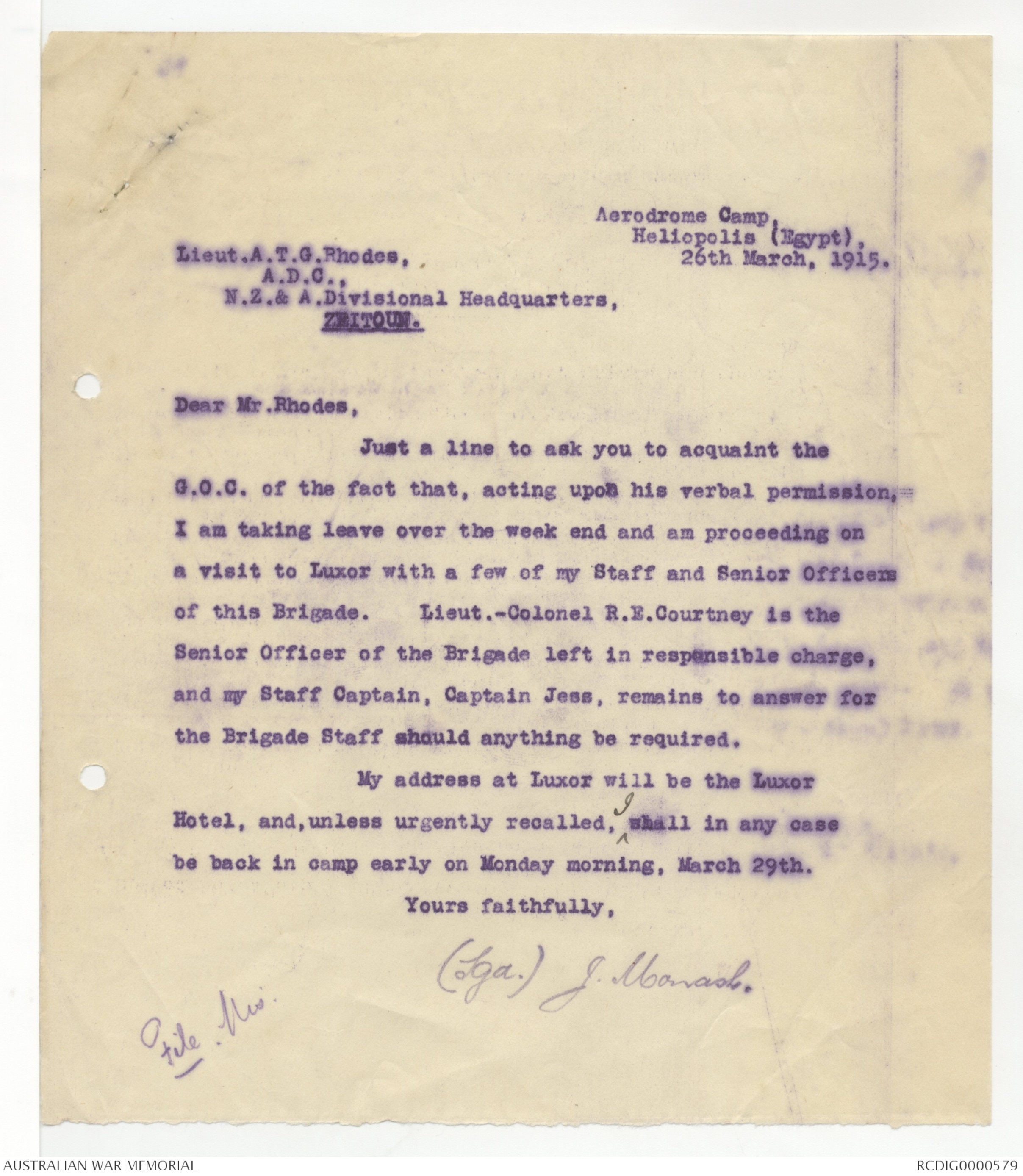
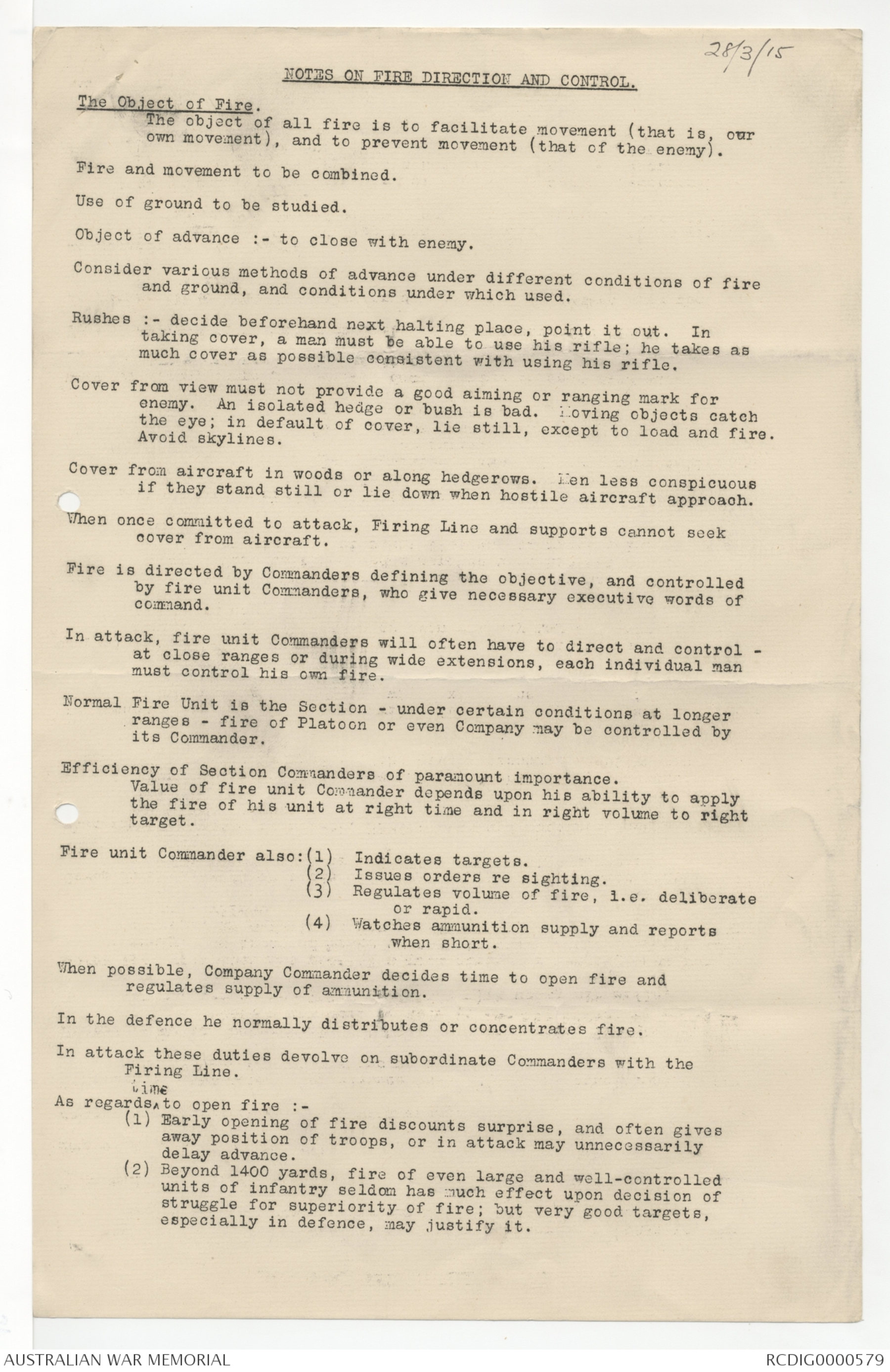
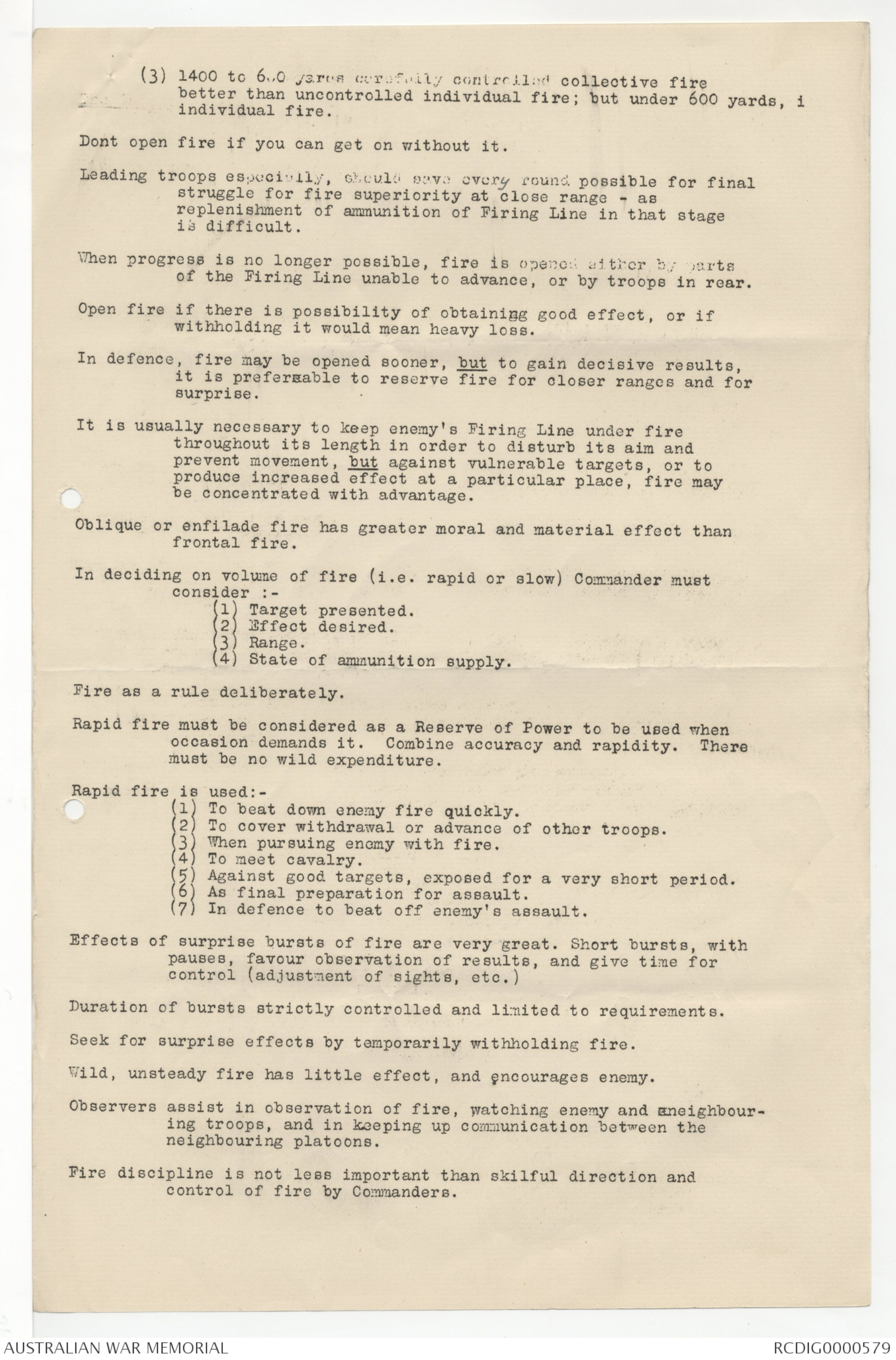
26/3/15
My dear Papa,
Just glance at attached letter
from the G.O.C. and let me have it back
as soon as you can.- I should like you
to furnish me with material in order to enable me
to let the General know that, this today being the
duty tour of your Battalion, many men were
away because of Divisional orders.- If I
can get these data, I can send him a reply
before we leave for Luxor.
John Monash
Col
26/3/15
Headquarters,
New Zealand and Australian Division
My dear Colonel
I am much
disappointed, & I am sure
you will be too, to hear
that, at field-firing this
morning, the companies
were unusually weak.
I had hoped, after
our conversation the other
morning, that matters
would have improved in
2/
this respect.
The platoon was 25
strong out of a strength of 62!
I am afraid it is not
yet understood that everyone
must go to work in the Field,
& that administrative questions,
and routine duties must give
way to Field work.
Courts Martial, Boards,
fatigues, guard & etc should
take place in the late
3/
afternoon after work. This is
the unwaivable rule in the
British Army now.
I saw a lot of men
falling out yesterday too,
though it was not a long day
or a hard march. In a letter
I have just received from
a General Officer at the
Front he writes "The
strictest march discipline
4/
is, needless to say, essential, &
was very difficult indeed to
keep up during the retreat,
when the men were so tired
that they would have been
content to lie down & sleep
& let the German Army walk
over them".
Yours Sincerely
A Godley
I hope you will have a good trip
to Luxor
Aerodrome Camp
Heliopolis (Egypt)
26th March, 1915.
Lieut.-Colonel R.E.Courtney, V.D.,
C.O., 14th Battalion.
Please note that I shall be absent from this camp on
leave between 7p.m. on Friday, March 26th, and 9a.m. on Monday,
March 29th, during which period you will be Senior Officer of
the Brigade present. Captain Jess, Staff Captain, and the
remainder of the Brigade Staff are at your disposal. My address
during Saturday and Sunday will be the Luxor Hotel Luxor.
JM
Colonel,
Commanding Fourth (Australian) Infantry Brigade,
PERSONAL
Aerodrome Camp,
Heliopolis (Egypt),
26th March, 1915.
Lieut.-Colonel W.G.Braithwaite, D.S.O.,
N.Z. & A.Divisional Headquarters,
ZEITOUN.
My dear Colonel,
I have just received your letter of the
25th instant, and the arrangements you propose for
instruction of Fire Unit Commanders entirely fit in with
my own ideas. The whole of these arrangements will be
given effect to in my next week's Training Programme,
and I shall get Captain Rose to make all the preliminary
arrangements requisite for the instruction on the lines
that you desire.
I have very grave doubt whether we can
arrange the quantity of blank and ball ammunition which
is required, but will make every effort to do so. If
I fail my Staff Captain will see you about this.
Yours sincerely,
(Sgd.) J. Monash
File
Aerodrome Camp,
Heliopolis (Egypt),
26th March, 1915.
Lieut.A.T.G.Rhodes,
A.D.C.,
N.Z.& A.Divisional Headquarters,
ZEITOUN.
Dear Mr. Rhodes,
Just a line to ask you to acquaint the
G.O.C. of the fact that, acting upon his verbal permission,
I am taking leave over the week end and am proceeding on
a visit to Luxor with a few of my Staff and Senior Officers
of this Brigade. Lieut.-Colonel R.E.Courtney is the
Senior Officer of the Brigade left in responsible charge,
and my Staff Captain, Captain Jess, remains to answer for
the Brigade Staff should anything be required.
My address at Luxor will be the Luxor
Hotel, and, unless urgently recalled, I shall in any case
be back in camp early on Monday morning, March 29th.
Yours faithfully,
(Sgd.) J Monash
File
28/3/15
NOTES ON FIRE DIRECTION AND CONTROL.
The Object of Fire.
The object of all fire is to facilitate movement (that is, our
own movement), and to prevent movement (that of the enemy).
Fire and movement to be combined.
Use of ground to be studied.
Object of advance :- to close with enemy.
Consider various methods of advance under different conditions of fire
and ground, and conditions under which used.
Rushes :- decide beforehand next halting place, point it out. In
taking cover, a man must be able to use his rifle; he takes as
much cover as possible consistent with using his rifle.
Cover from view must not provide a good aiming or ranging mark for
enemy. An isolated hedge or bush is bad. Moving objects catch
the eye; in default of cover, lie still, except to load and fire.
Avoid skylines.
Cover from aircraft in woods or along hedgerows. Men less conspicuous
if they stand still or lie down when hostile aircraft approach.
When once committed to attack, Firing Line and supports cannot seek
cover from aircraft.
Fire is directed by Commanders defining the objective, and controlled
by fire unit Commanders, who give necessary executive words of
command.
In attack, fire unit Commanders will often have to direct and control -
at close ranges or during wide extensions, each individual man
must control his own fire.
Normal Fire Unit is the Section - under certain conditions at longer
ranges - fire of Platoon or even Company may be controlled by
its Commander.
Efficiency of Section Commanders of paramount importance.
Value of fire unit Commander depends upon his ability to apply
the fire of his unit at right time and in right volume to right
target.
Fire unit Commander also:(1) Indicates targets.
(2) Issues orders re sighting.
(3) Regulates volume of fire, i.e. deliberate
or rapid.
(4) Watches ammunition supply and reports
when short.
When possible, Company Commander decides time to open fire and
regulates supply of ammunition.
In the defence he normally distributes or concentrates fire.
In attack these duties devolve on subordinate Commanders with the
Firing Line.
As regards time to open fire :-
(1) Early opening of fire discounts surprise, and often gives
away position of troops, or in attack may unnecessarily
delay advance.
(2) Beyond 1400 yards, fire of even large and well-controlled
units of infantry seldom has much effect upon decision of
struggle for superiority of fire; but very good targets,
especially in defence may justify it.
(3) 1400 to 600 yards carefully controlled collective fire
better than uncontrolled individual fire ; but under 600 yards, i
individual fire.
Dont open fire if you can get on without it.
Leading troops especially, should save every round possible for final
struggle for fire superiority at close range - as
replenishment of ammunition of Firing Line in that stage
is difficult.
When progress is no longer possible, fire is opened either by parts
of the Firing Line unable to advance, or by troops in rear.
Open fire if there is possibility of obtaining good effect, or if
withholding would mean heavy loss.
In defence, fire may be opened sooner, but to gain decisive results,
it is preferable to reserve fire for closer ranges and for
surprise.
It is usually necessary to keep enemy's Firing Line under fire
throughout its length in order to disturb its aim and
prevent movement, but against vulnerable targets, or to
produce increased effect at a particular place, fire may
be concentrated with advantage.
Oblique or enfilade fire has greater moral and material effect than
frontal fire.
In deciding on volume of fire (i.e. rapid or slow) Commander must
consider :-
(1) Target presented.
(2) Effect desired.
(3) Range.
(4) State of ammunition supply.
Fire as a rule deliberately.
Rapid fire must be considered as a Reserve of Power to be used when
occasion demands it. Combine accuracy and rapidity. There
must be no wild expenditure.
Rapid fire is used : -
(1) To beat down enemy fire quickly.
(2) To cover withdrawal or advance of other troops.
(3) When pursuing enemy with fire.
(4) To meet cavalry.
(5) Against good targets, exposed for a very short period.
(6) As final preparation for assault.
(7). In defence to beat off enemy's assault.
Effects of surprise bursts of fire are very great. Short bursts, with
pauses, favour observation of results, and give time for
control (adjustment of sights, etc.)
Duration of bursts strictly controlled and limited to requirements.
Seek for surprise effects by temporarily withholding fire.
Wild, unsteady fire has little effect, and encourages enemy.
Observers assist in observation of fire, watching enemy and eneighbour-
ing troops, and in keeping up communication between the
neighbouring platoons.
Fire discipline is not less important than skilful direction and
control of fire by Commanders.
 Jacqueline Kennedy
Jacqueline KennedyThis transcription item is now locked to you for editing. To release the lock either Save your changes or Cancel.
This lock will be automatically released after 60 minutes of inactivity.